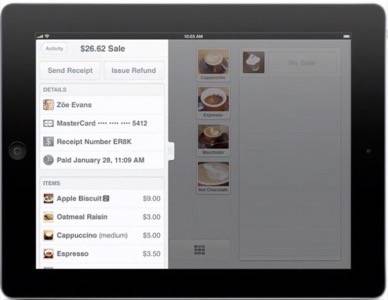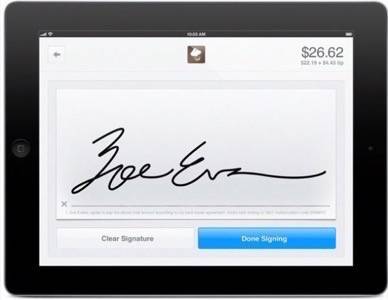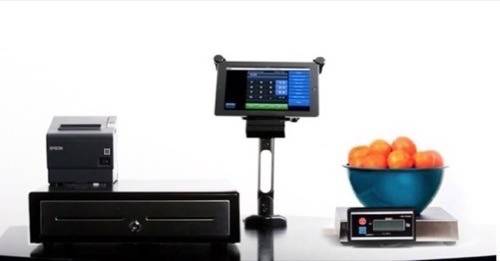
It was dinner at a fancy restaurant in Boston. After the last sip of Scotch was polished off, the waiter came over with the check… and an iPad. It was to take a survey about the quality of service, but it just as easily could have been used to pay the bill.
Tablets, especially Apple’s iPad, are increasingly finding homes in restaurants and local businesses. They are changing how businesses conduct transactions and receive customer feedback. In a data-driven world, Main Street retailers are on the verge of a significant evolution.
Disrupting the Point of Sale
You have seen it before. You make an order at your local coffee shop or restaurant, or buy an item from a local merchant. The server or cashier punches a couple buttons on a static touchscreen, runs your debit card and hands you a receipt. Using these Point-of-Sale (POS) systems is now so common that consumers pretty much take them for granted.
The people who own the businesses do not take them for granted. They often have a lot of money invested in them. The top POS vendors, such as Aloha, Micros and POSitouch, charge thousands of dollars to restaurants and retailers to set up and maintain these systems. For a restaurant that seats 100 people, the owners likely paid anywhere from $8,000 to $20,000 to set up three or four terminals. The more amenities that the local business wants, the more POS vendors will gouge its pocketbooks.

Beyond the tremendous cost, most of these POS systems are horribly out of date. Many of them run on Microsoft’s .NET architecture and are prone to all of the same hiccups that any Windows PC will face over the course of its life.
Restaurant owners likely do not care how technologically out-of-date their POS systems are, as long as they work. According to Phil Beauregard from Boston-based Objective Logistics, the entire culinary industry tends to be about five to seven years behind technology trends.
“When they first came out, they were essentially glorified cash registers,” Beauregard said. “The [POS industry] has mimicked the entire PC industry.”
Like the PC industry, the POS sector is about to see a major change in how businesses are interacting with technology. “Everything is getting untethered,” Beauregard said.
The Evolution: Mobile + Cloud
“When you are carrying around a tablet, you are carrying a gateway to the cloud,” said Nebula CEO and former NASA CTO Chris Kemp in an interview last year.
The fundamental thing to know about mobile technology is that its primary computing power is done in the cloud. Yes, chip sets have gotten smaller, cameras are more compact and powerful, and batteries are more efficient than they used to be, but the biggest driver of mobile technology is the ability to offload the actual data and computing power to the cloud.
This is something that innovators and enterprises have known for some time. The average small business owner? Not so much.
“Cloud computing” is like an abstract theory to most people. They know the term, they kind of know what it does, but the full meaning of the cloud is lost on them. For the most part, they do not care. Consumers just want things to work. Local businesses just want them to work, but also be cost efficient.
This is where tablets are poised to disrupt the entire POS industry. They are cheap, collect data on customers’ purchases and make that data easily accessible across any type of computing system. They can be used to make payments, take surveys, provide coupons and notify consumers of offers.
The best part for local businesses: Tablets are a lot cheaper than traditional POS systems.
“For all new restaurant businesses, they’ll seriously evaluate some form of tablet as their POS. New locations of existing restaurants will probably stick with whatever tech they’ve got, but all brand-new businesses are going to be taking a hard look at the cheap/portable nature of an iPad or Android tablet solution,” said Seth Priebatsch, CEO of Boston-based SCVNGR, which provides a mobile payment tool called LevelUp.
The leader in the charge to turn the iPad into the new era of POS terminal is San Francisco-based Square. The company that released the original dongle for smartphones to swipe credit cards has also created an iPad app called the Square Register. It has the ability to turn an iPad into a POS system that works as well or better than anything from the traditional POS vendors. As a standalone product, the Square Register is a great option for local boutiques or coffee houses, where all that is needed is the ability to make transactions and provide receipts.
According to Square spokesperson Aaron Zamost, 75% of small businesses will buy a tablet this year. Only 6% of retailers said they haved used a mobile POS device, but half of survey respondents panned to adopt such devices over the next 18 months.
Restaurants are another matter. When a server takes an order, that information needs to go to several different places within the establishment. Chefs need the ticket to know when and what to make (cooks call these “duckets”). Bartenders need the tickets to coordinate with the server on what drinks need to be made. In a restaurant, communication is vital and often that is handled through the POS system.
The Square Register does not yet fulfill all the needs of such an establishment. But other companies are working to turn the iPad into a fully functional POS system for restaurant use.
San Francisco-based Revel features a full suite of products designed to turn iPads into an effective POS system – including employee logins, order taking, payment processing and “cook view” for the duckets. It has customer relationship management (CRM) features and real-time reporting and inventory control. These are all capabilities a traditional POS could offer, but Revel does it for a third of the price, about $1,500 per iPad and a $100/month cloud service fee. Other services, like E La Carte, provide custom-built tablets without an upfront installation fee.

Image: Revel iPad POS
Untethered, Unplugged & Disrupted
In the chain of innovation, we are not talking about anything extraordinarily drastic. iPads have been around for three years now and the concept of cloud computing has been around much longer. The confluence of mobile and cloud technology has invaded enterprise organizations over the last couple of years and it is now starting to trickle down to the Main Street level. Smart startups have looked at the middle class of American businesses and seen that it is ripe for the plucking.
Square recognized it first, but any company focused on marketing, payments, offers and infrastructure will soon see that there are billions of dollars at stake.
Are you a local business owner? What do you use for a POS system? A classic register, a touch-based terminal or some type of mobile device? Let us know in the comments.

















